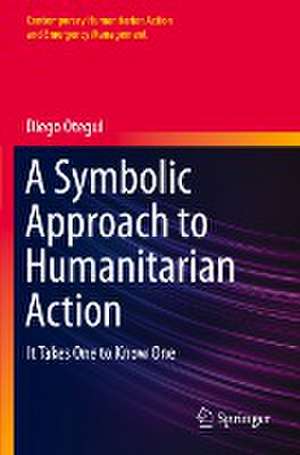A Symbolic Approach to Humanitarian Action: It Takes One to Know One: Contemporary Humanitarian Action and Emergency Management
Autor Diego Oteguien Limba Engleză Paperback – 15 oct 2023
This way of looking at humanitarian action builds upon a robust theoretical framework called Institutional Logics, which helps us identify and interpret how individuals make sense of their reality. So it brings the complex world of the individual into a discussion that generally considers the organization as the unit of analysis. Studying humanitarian action through this alternative lens makes it easy to see that objective and verifiable post-disaster information is a necessary but not a sufficient condition to design humanitarian interventions, let alone assess their value and benefits.
A Symbolic Approach to Humanitarian Action: It Takes One to Know One aims to bridge the gap between research and practice in humanitarian action by translating academic knowledge into an accessible format that can be used by practitioners to improve their work on the ground.
| Toate formatele și edițiile | Preț | Express |
|---|---|---|
| Paperback (1) | 522.10 lei 6-8 săpt. | |
| Springer International Publishing – 15 oct 2023 | 522.10 lei 6-8 săpt. | |
| Hardback (1) | 641.03 lei 6-8 săpt. | |
| Springer International Publishing – 14 oct 2022 | 641.03 lei 6-8 săpt. |
Preț: 522.10 lei
Preț vechi: 614.24 lei
-15% Nou
Puncte Express: 783
Preț estimativ în valută:
99.92€ • 103.22$ • 83.16£
99.92€ • 103.22$ • 83.16£
Carte tipărită la comandă
Livrare economică 25 martie-08 aprilie
Preluare comenzi: 021 569.72.76
Specificații
ISBN-13: 9783031169885
ISBN-10: 3031169883
Ilustrații: XXVII, 154 p. 9 illus.
Dimensiuni: 155 x 235 mm
Greutate: 0.27 kg
Ediția:1st ed. 2022
Editura: Springer International Publishing
Colecția Springer
Seria Contemporary Humanitarian Action and Emergency Management
Locul publicării:Cham, Switzerland
ISBN-10: 3031169883
Ilustrații: XXVII, 154 p. 9 illus.
Dimensiuni: 155 x 235 mm
Greutate: 0.27 kg
Ediția:1st ed. 2022
Editura: Springer International Publishing
Colecția Springer
Seria Contemporary Humanitarian Action and Emergency Management
Locul publicării:Cham, Switzerland
Cuprins
1. Introduction.- 2. Humanitarian Convergence.- 3. Relational Humanitarianism.- 4. Institutional Humanitarianism.- 5. The Symbolic Response to Disasters.- 6. A New Vision of Humanitarian Action.
Notă biografică
Diego Fernandez Otegui is an Assistant Professor of Crisis and Disaster Management at the University of Central Missouri. He was born in Argentina in 1974, and is an experienced humanitarian practitioner. He participated in missions in several countries, including East Timor, the Democratic Republic of Congo, India, and Mozambique. He is also an acclaimed scholar. He received his Ph.D. in Disaster Science and Management from the University of Delaware. He has published in top scientific and academic journals and lectured at numerous conferences worldwide, including in the Netherlands, Korea, Ethiopia, India, and Mexico. He currently serves on the Board of Directors of the International Humanitarian Studies Association and is the US Representative for the University Network of the Americas for Disaster Risk Reduction. In his private practice, he is an international consultant, CEO of the Imara International Humanitarian Group, and Executive Director of the Imara Foundation. He currently lives in the United States with his wife and seven years old daughter. He plays the guitar, enjoys running and swimming, and is a member of the United Methodist Church.
Textul de pe ultima copertă
This book aims to present an alternative view of humanitarian action. It adds to current conversations and dilemmas within the humanitarian sphere by departing from traditional views that consider humanitarian interventions as a concrete human activity aimed at providing relief to disaster victims. Much differently, it invokes the idea that humanitarian action is also a cognitive process. In this process, both humanitarians and disaster survivors alike, unknowingly, apply historically, societally, and culturally defined symbolic constructions to make sense of post-disaster information and to make decisions. In the specific case of humanitarian workers, these symbolic constructions influence how they understand their post-disaster reality, including how they relate to those they consider to be in pain or distress.
This way of looking at humanitarian action builds upon a robust theoretical framework called Institutional Logics, which helps us identify and interpret how individuals make sense of their reality. So it brings the complex world of the individual into a discussion that generally considers the organization as the unit of analysis. Studying humanitarian action through this alternative lens makes it easy to see that objective and verifiable post-disaster information is a necessary but not a sufficient condition to design humanitarian interventions, let alone assess their value and benefits.
A Symbolic Approach to Humanitarian Action: It Takes One to Know One aims to bridge the gap between research and practice in humanitarian action by translating academic knowledge into an accessible format that can be used by practitioners to improve their work on the ground.
This way of looking at humanitarian action builds upon a robust theoretical framework called Institutional Logics, which helps us identify and interpret how individuals make sense of their reality. So it brings the complex world of the individual into a discussion that generally considers the organization as the unit of analysis. Studying humanitarian action through this alternative lens makes it easy to see that objective and verifiable post-disaster information is a necessary but not a sufficient condition to design humanitarian interventions, let alone assess their value and benefits.
A Symbolic Approach to Humanitarian Action: It Takes One to Know One aims to bridge the gap between research and practice in humanitarian action by translating academic knowledge into an accessible format that can be used by practitioners to improve their work on the ground.
Caracteristici
Proposes a new way of understanding humanitarian action from an interdisciplinary perspective Provides new theoretical insights departing from the experience of humanitarian workers on the ground Applies institutional logics to the study of different domains within humanitarian action
